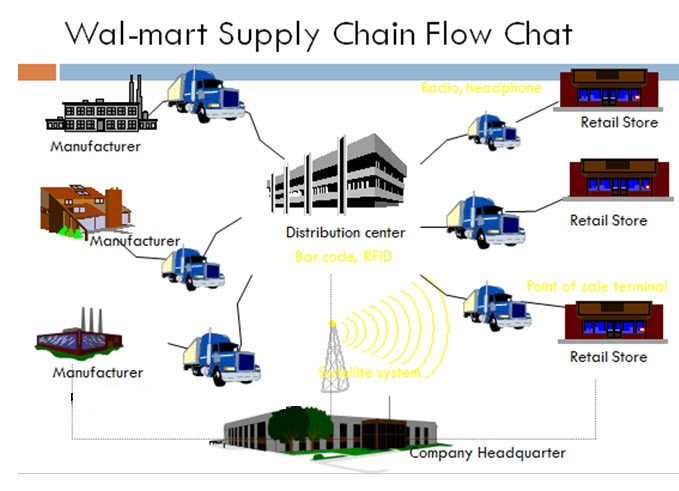Effective logistics management can provide a major source of competitive advantage. The bases for successes in the marketplace are numerous, but a simple model has been based around the three C’s — Customer, Company & Competitor. The source of competitive advantage is found firstly in the ability of the organization to differentiate itself, in the eyes of the customer, from its competition and secondly by operating at a lower cost and hence at greater profit. Seeking a sustainable competitive advantage has become the concern of every manager who realizes the realities of the marketplace. It is no longer acceptable to assume that the goods will sell themselves. An elemental, commercial success is derived either form a cost advantage or aContinue reading
Logistics Basics
Case Study: Wal-Mart’s Distribution and Logistics System
As the world’s largest retailer with net sales of almost $419 billion for the fiscal year 2011, Wal-Mart is considered a “best-in-class” company for its supply chain management practices. These practices are a key competitive advantage that have enabled Wal-Mart to achieve leadership in the retail industry through a focus on increasing operational efficiency and on customer needs. Wal-Mart’s corporate website calls “logistics” and “distribution” the heart of its operation, one that keeps millions of products moving to customers every day of the year. Wal-Mart’s highly-automated distribution centers, which operate 24 hours a day and are served by Wal-Mart’s truck fleet, are the foundation of its growth strategy and supply network. In the United States alone, the company hasContinue reading
Logistic information system and it’s objectives
Logistic information system is nothing but a part of Management Information System to manage, control and measure the logistical activities. These activities occur within the organization or as well as overall across the supply chain. Logistics information systems are important for achieving logistics efficiency and effectiveness. In an enterprise, logistics information system seeks to achieve the following: It ensures of logistics functional operations into a process pursuing customer satisfaction at the lowest total cost. Information system facilitates planning and control of the logistical activities related to order fulfillment. It makes the firm more competitive, by making better tactical and strategic decision for the benefits of the firm and its customer. Helps provide customers information regarding product availability, order status, andContinue reading
Concept of Strategic Logistics Planning
Strategic logistics planning is defined as a unified, comprehensive, and integrated planning process to achieve competitive advantage through increased value and customer service, which results in superior customer satisfaction, by anticipating future demand for logistics services and managing the resources of the entire supply chain. Strategic logistics planning carried out within the framework of the overall corporate goals and plan. It therefore requires an in-depth understanding as to how the different elements and logistics activities relate in terms of trade-offs and the total cost to the organisation. Logistics can therefore best formulate its own strategy only by understanding the overall corporate strategy. Formulating the Strategic Logistics Plan The development of the strategic logistics plan is dependent on the marketing, manufacturing,Continue reading
Categories of logistics
Logistics is the process of accurately interpreting customer requirements or orders or marketing strategy, as also providing manufacturing operations support, with precise execution of the process of reaching the product material from the point of origin to the point of requirement consumption ensuring suitable care of the product material throughout to avoid damage deterioration, continuously ensuring the lowest possible cost throughout the process. Logistics is concerned with getting products and services where they are needed when they are desired. The responsibility of logistics is the temporal and spatial positioning of raw materials, work in progress, and finished inventories when and where required. Integrated logistics support, when properly understood and applied, can provide the means to identify and resolve many logisticContinue reading
Business Objectives of Logistics Systems
The General objectives of the logistics can be summarized as: Cost reduction Capital reduction Service improvement The specific objective of an ideal logistics system is to ensure the flow of supply to the buyer, the: right product right quantities and assortments right places right time right cost / price and, right condition This implies that a firm will aim at having a logistics system which maximizes the customer service and minimizes the distribution cost. However, one can approximate the reality by defining the objective of logistics system as achieving a desired level of customer service i.e., the degree of delivery support given by the seller to the buyer. Thus, logistics management starts with as curtaining customer need till its fulfillmentContinue reading
